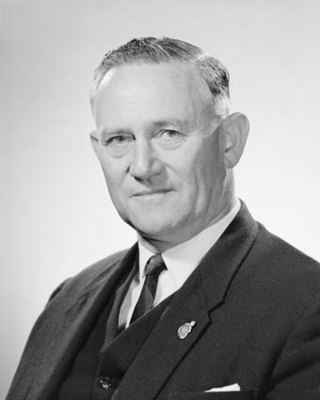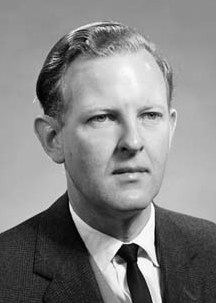
The Australian Senate is the upper house of the bicameral Parliament of Australia, the lower house being the House of Representatives.

The Australia Party was a minor centrist political party in Australia from 1969 to 1986. It was most influential in the late 1960s and early 1970s.

The 1996 Australian federal election was held to determine the members of the 38th Parliament of Australia. It was held on 2 March 1996. All 148 seats of the House of Representatives and 40 seats of the 76-seat Senate were up for election. The centre-right Liberal/National Coalition led by Opposition Leader John Howard of the Liberal Party and coalition partner Tim Fischer of the National Party defeated the incumbent centre-left Australian Labor Party government led by Prime Minister Paul Keating in a landslide victory. The Coalition won 94 seats in the House of Representatives, which is the largest number of seats held by a federal government to date, and only the second time a party had won over 90 seats at a federal election.

The Family First Party was a conservative political party in Australia which existed from 2002 to 2017. It was founded in South Australia where it enjoyed its greatest electoral support. Since the demise of the Australian Conservatives into which it merged, it has been refounded in that state as the Family First Party (2021), where it contested the state election in 2022, but failed to win a seat.

Sir David Brand KCMG was an Australian politician. He was the longest-serving premier of Western Australia, in office from 1959 to 1971, and was state leader of the Liberal Party from 1957 to 1972.

The Libertarian Party (LP), formerly known as the Liberal Democratic Party (LDP), is an Australian political party founded in Canberra in 2001. The party espouses smaller government and supports policies that are based on classical liberal, libertarian principles, such as lower taxes, opposing restrictions on civil liberties, decentralisation, uranium mining, and the relaxation of smoking laws.

Geraldton is an electoral district of the Legislative Assembly in the Australian state of Western Australia.
Greenough was an electoral district of the Legislative Assembly in the Australian state of Western Australia from 1890 to 2008.

The National Alliance was an Australian electoral alliance. The alliance was formed in 1974 as a short-lived arrangement between the Western Australian branches of the Country Party and Democratic Labor Party (DLP), covering the 1974 Western Australian state election and 1974 federal election.

The 1977 Australian federal election was held in Australia on 10 December 1977. All 124 seats in the House of Representatives and 34 of the 64 seats in the Senate were up for election.

The 1975 Australian federal election was held in Australia on 13 December 1975. All 127 seats in the House of Representatives and all 64 seats in the Senate were up for election, due to a double dissolution.
Environmentalists for Nuclear Energy Australia, formerly called Conservatives for Climate and Environment, was a political party registered in Australia from 2007 to 2010. EFN-Australia referred to itself as a not-for-profit environmental association, registered as a political party. It was the Australian affiliate of Environmentalists for Nuclear, and the party campaigned unsuccessfully to gain nuclear power in Australia.

Wylie Talbot Gibbs is an Australian former surgeon and politician. He served in the House of Representatives from 1963 to 1969, representing the Liberal Party.
This is a list of members of the Western Australian Legislative Assembly between the 1911 election and the 1914 election, together known as the Eighth Parliament. All members who sat as Liberals, apart from those returned at by-elections, were elected under the "Ministerial" designation at the 1911 election.
Peter Anthony Richardson is an Australian doctor and former politician. He was a member of the House of Representatives from 1975 to 1977, representing the Division of Tangney. He was elected as a member of the Liberal Party, but shortly before the 1977 federal election defected to the libertarian Progress Party and was an unsuccessful candidate for the Senate.

Hartley Gordon James "Harry" Cant was an Australian politician. Born at Mount Magnet, Western Australia, he was educated at state schools and then the Kalgoorlie School of Mines, becoming a miner. He was an official with the Australian Workers' Union. In 1958, he was elected to the Australian Senate as a Labor Senator for Western Australia. He held the seat until 1974, when he retired. Cant died in 1977.
The National Liberal Party was a short-lived political party in the Australian state of Victoria. It was formed in 1974 by Senator George Hannan, as a breakaway from the Liberal Party. The party failed to win any seats at the 1974 federal election, and disbanded soon after.

The Libertarian Party of Australia was an Australian political party based in South Australia. It was formed as a result of a split in the Workers Party over the adoption of the new name "Progress Party".
A by-election for the seat of Greenough in the Legislative Assembly of Western Australia was held on 1 November 1975. It was triggered by the resignation of Sir David Brand on 21 August 1975. The Liberal Party retained Greenough at the by-election, with its candidate, Reg Tubby, winning 57.3 percent of the two-candidate-preferred (2CP) vote. However, the party suffered a swing of 33.6 points on first preferences, in part due to the entry of two parties that had not stood in Greenough at the 1974 state election. The Workers Party was in fact making its electoral debut, and surprised most observers by polling 13 percent on first preferences.

The Great Australian Party (GAP) is a right-wing political party in Australia. The party was formally registered by the Australian Electoral Commission (AEC) on 7 April 2019 and is associated with former senator Rod Culleton who had been elected in the 2016 Australian federal election as a senator for Western Australia, but subsequently found to have been ineligible and was disqualified.














